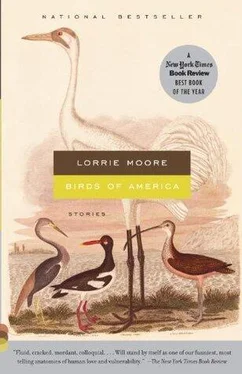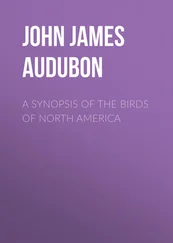“Maybe,” said Carla. “But maybe not.”
When Nitchka finally left him, she first watched her favorite TV show, then turned off the television, lifted up her CD player and her now-unhooked VCR, and stopped to poise herself dramatically in the front hall. “You know, you haven’t a clue what the human experience is even about,” she said.
“This song and dance again,” he said. “Are you taking it on the road?” She set her things down outside in the hall so she could slam the door loudly and leave him — leave him, he imagined, for some new, handsome man she had met at work. Dumped for Hunks. That was the title of his life. In heaven, just to spite her, that would be the name of his goddamn band.
He drank a lot that week, and on Friday, his boss, McCarthy, called to say Noel was fired. “You think we can run a lawn store this way?” he said.
“If there was a gun to your head,” said Noel, “what song would you sing?”
“Get help,” said McCarthy. “That’s all I have to say.” Then there was a dial tone.
Noel began to collect unemployment, getting to the office just before it closed. He began to sleep in the days and stay up late at night. He got turned around. He went out at midnight for walks, feeling insomniac and mocked by the dark snore of the neighborhood. Rage circled and built in him, like a saxophone solo. He began to venture into other parts of town. Sidewalks appeared, then disappeared again. The moon shone on one side and then on the other. Once, he brought duct tape with him and a ski mask. Another time, he brought duct tape, a ski mask, and a gun one of his stepfathers had given him when he was twenty. If you carefully taped a window from the outside, it could be broken quietly: the glass would stick to the tape and cave gently outward.
“I’m not going to hurt you,” he said. He turned on the light in the bedroom. He taped the woman’s mouth first, then the man’s. He made them get out of bed and stand over by the dresser. “I’m going to take your TV set,” said Noel. “And I’m going to take your VCR. But before I do, I want you to sing me a song. I’m a music lover, and I want you to sing me one song, any song. By heart. You first,” he said to the man. He pressed the gun to his head. “One song.” He pulled the duct tape gently off the man’s mouth.
“Any song?” repeated the man. He tried to look into the eyeholes of Noel’s ski mask, but Noel turned abruptly and stared at the olive gray glass of the TV.
“Yeah,” said Noel. “Any song.”
“Okay.” The man began. “ ‘O beautiful for spacious skies, for amber waves of grain …’ ” His voice was deep and sure. “ ‘… for purple mountain majesties …’ ” Noel turned back and studied the man carefully. He seemed to know it all by heart. How had he learned it all by heart? “You want all the verses?” the man stopped and asked, a bit too proudly, Noel thought, for someone who had a gun aimed his way.
“Nah, that’s enough,” Noel said irritably. “Now you,” he said to the woman. He pulled the duct tape off her mouth. Her upper lip was moistly pink, raw from the adhesive. He glanced down at the tape and saw the spiky glisten of little mustache hairs. She began immediately, anxiously, to sing. “ ‘You are my lucky star. I’m lucky where you are/Two lovely eyes at me that were—’ ”
“What kind of song is this?”
She nervously ignored him, kept on: “ ‘… beaming, gleaming, I was starstruck.’ ” She began to sway a little, move her hands up and down. She cleared her throat and modulated upward, a light, chirpy warble, though her face was stretched wide with fright, like heated wax. “ ‘You’re all my lucky charms. I’m lucky in your arms. …’ ” Here her hands fluttered up to her heart.
“All right, that’s enough. I’m taking the VCR now.”
“That’s practically the end anyway,” said the woman.
At the next house he did, he got a Christmas carol, plus “La Vie en Rose.” At the third house, the week following, he got one nursery rhyme, half a school song, and “Memory” from Cats . He began to write down the titles and words. At home, looking over his notepad, he realized he was creating a whole new kind of songbook. Still the heart of these songs eluded him. Looking at the words the next day, a good, almost-new VCR at his feet, he could never conjure the tune. And without the tune, the words seemed stupid and half-mad.
To avoid the chaos of the house entirely, Ruth took to going to matinees. First-run movies, second-run — she didn’t care. Movies were the ultimate real estate: you stepped in and looked around and almost always bought. She was especially stirred by a movie she saw about a beautiful widow who fell in love with a space alien who had assumed human form — the form of the woman’s long lost husband! Eventually, however, the man had to go back to his real home, and an immense and amazing spaceship came to get him, landing in a nearby field. To Ruth, it seemed so sad and true, just like life: someone assumed the form of the great love of your life, only to reveal himself later as an alien who had to get on a spaceship and go back to his planet. Certainly it had been true for Terence. Terence had gotten on a spaceship and gone back long ago. Although, of course, in real life you seldom saw the actual spaceship. Usually, there was just a lot of drinking, mumbling, and some passing out in the family room.
Sometimes on the way back from the movies, she would drive by their old house. They had sold it to an unmemorable young couple, and now, driving past it slowly, eyeing it like a pervert, she began to want it back. It was a good house. They didn’t deserve it, that couple: look how ignorant they were — pulling out all those forsythia bushes as if they were weeds.
Or maybe they were weeds. She never knew anymore what was good life and what was bad, what was desirable matter and what was antimatter, what was the thing itself and what was the death of the thing: one mimicked the other, and she resented the work of having to distinguish.
Which, again, was the false spirea and which was the true?
The house was hers. If it hadn’t been for that damn banana bread, it still would be hers.
Perhaps she could get arrested creeping slowly past in her car like this. She didn’t know. But every time she drove by, the house seemed to see her and cry out, It’s you! Hello, hello! You’re back! So she tried not to do it too often. She would speed up a little, give a fluttery wave, and drive off.
At home, she could not actually net the crows, though their old habitat, the former cornfield that constituted the neighborhood, continued to attract them like an ancestral land or a good life recalled over gin. They hovered in the yards, tormented the cats, and ate the still-wet day-old songbirds right out of their nests. How was she supposed to catch such fiends? She could not. She draped nets in the branches of trees, to snag them, but always a wind caused the nets to twist or drop, or pages of old newspaper blew by and got stuck inside, plastering the nets with op-ed pages and ads. From the vegetable garden now turning flower bed came the persistent oniony smell of those chives not yet smothered by the weed barrier. And the rhubarb, too, kept exploding stubbornly through, no matter how she plucked at it, though each clutch of stalks was paler and more spindly than the last.
She began generally not to feel well. Never a temple, her body had gone from being a home, to being a house, to being a phone booth, to being a kite. Nothing about it gave her proper shelter. She no longer felt housed within it at all. When she went for a stroll or was out in the yard throwing the nets up into the oaks, other people in the neighborhood walked briskly past her. The healthy, the feeling well, when they felt that way, couldn’t remember feeling any other, couldn’t imagine it. They were niftily in their bodies. They were not only out of the range of sympathy; they were out of the range of mere imagining. Whereas the sick could only think of being otherwise. Their hearts, their every other thought, went out to that well person they hated a little but wanted to be. But the sick were sick. They were not in charge. They had lost their place at the top of the food chain. The feeling well were running the show; which was why the world was such a savage place. From her own porch, she could hear the PA announcements from the zoo. They were opening; they were closing; would someone move their car. She could also hear the elephant, his sad bluesy trumpet, and the Bengal tiger roaring his heartbreak: all that animal unhappiness. The zoo was a terrible place and a terrible place to live near: the pacing ocelot, the polar bear green with fungus, the zebra demented and hungry and eating the fence, the children brought there to taunt the animals with paper cups and their own clean place in the world, the vulture sobbing behind his scowl.
Читать дальше












